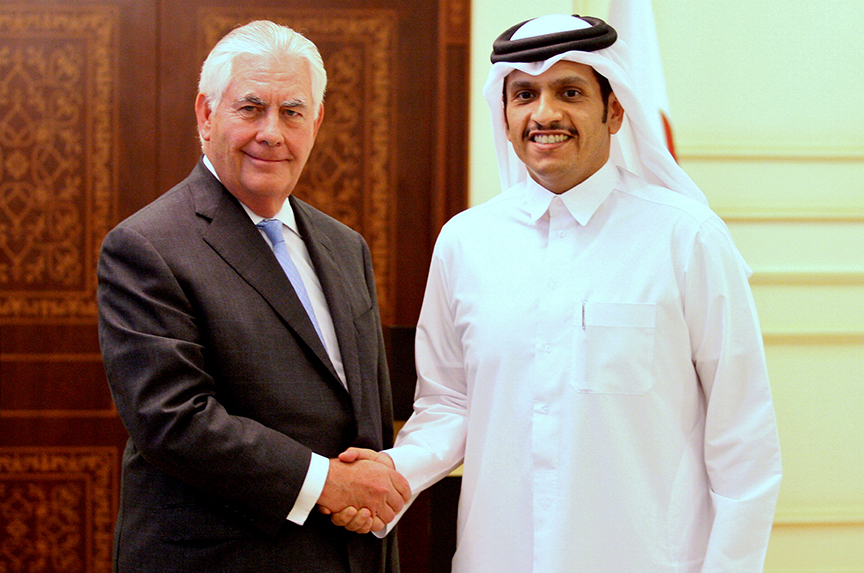
Qatar crisis creates a headache for the United States
Nearly two months in, the diplomatic crisis between the Arab Gulf states is growing ever more complicated. The July 16 Washington Post report that cites unnamed US intelligence officials as claiming that the United Arab Emirates (UAE) precipitated the diplomatic row with Qatar by hacking Qatari state-run news outlets and attributing false statements to the tiny emirate’s emir, Sheikh Tamim bin Hamad Al Thani, is, if true, troubling for several reasons.
Emirati officials plotted the hack on May 24, according to the Post. The next day, Al Thani was reported as expressing support for Iran, Hamas, Hezbollah, Israel, and saying there were “tensions” between Qatar and US President Donald J. Trump’s administration.
Qatar News Agency (QNA) said at the time that its website and Twitter account had been hacked. US intelligence agencies have yet to publicly place responsibility for the hacking. It is notoriously difficult to attribute responsibility for hacks. Emirati officials, meanwhile, have refuted the Post’s report.
What is known for certain is that Saudi and Emirati outlets picked up the fake news stories and ran them, even after they were disavowed by the Qataris. Saudi Arabia, the UAE, Egypt, and Bahrain—also known as the quartet—then banned Qatari news outlets within their borders, including Al Jazeera, in response to the false statements. On June 5, the quartet severed diplomatic relations with Qatar, told Qatari nationals to leave, and closed their borders to air, sea, and land traffic bound for Qatar.
Here’s why the Post report, if true, would be troubling.
First, the possibility that the spat was initiated by one key US partner against another, dragging the United States into the middle, could complicate US operations in the region if tensions continue to rise. The UAE and Saudi Arabia have indicated that they will not present states or businesses with an ultimatum on choosing between doing business with them or Qatar. However, the UAE has said it wants the United States to move its forces from the Qatari base Al Udeid, the United States’ largest regional military installation, to the UAE. The United States seems unlikely to make this shift. The allegations against the UAE would put the United States in an even more awkward situation if proven to be true and likely harden Qatar’s position in negotiations to defuse the crisis.
Second, the hacking would set a highly troubling precedent and could have dangerous escalatory effects. Regardless of who undertook the operation against QNA, the template of planting a false news story to justify a diplomatic crisis could be copied in the future, with potentially more serious consequences. The United States should encourage all sides to disavow the initial hacking, and call on the quartet to act more responsibly in spreading news disavowed by a state.
Third, the conflict distracts the Gulf states from playing a constructive role in ending the region’s most pressing security crises, especially the Saudi-led coalition’s war against the Houthis in Yemen. The Saudis and their coalition partners have already been hampered in their ability to assist the United States with its campaign against the Islamic State of Iraq and al-Sham (ISIS) as they devote resources to the Yemen war. With ISIS receding since Iraqi forces retook Mosul, the United States could benefit from Gulf financial and diplomatic support to strengthen Iraqi Prime Minister Haider al-Abadi’s government against Iran-backed Shia militias looking to make political inroads. Fragile Gulf-Iraq relations are unlikely to gain much momentum, however, if the Gulf Cooperation Council (GCC) states remain in disarray.
Finally, the hacking and broader crisis undermine the prospects for the United States to work in a multilateral capacity with the Gulf states. The spat has waylaid, for the foreseeable future, the Trump administration’s plans for a so-called Arab NATO, and certainly undoes efforts launched under the Obama administration to enhance multilateral cooperation among the United States and the Gulf states. Improving interoperability toward a shared, GCC-wide missile defense system has been painstakingly slow even when Gulf relations were trending positively; it is now likely to be indefinitely stalled, or limited in scope. Similar collaborative work on counterterrorism financing and especially cybersecurity are likely dead in the water.
More broadly, the crisis underlines the GCC’s lack of utility as a cooperative forum for the Gulf states on defense issues. The United States has long tried to use the GCC as the venue to pursue multilateral defense cooperation. This effort has had little success due to reticence on the part of smaller GCC members to be pulled into the larger states’ political and decision-making orbits. The possibility that the Saudis and Emiratis could push Qatar out of the GCC highlights the largely symbolic nature of the organization and points to little meaningful work being achieved through that venue.
Iran, troublingly, will be the immediate-term beneficiary of this chaos. Countering Iran’s destabilizing behavior throughout the region is a priority across the Trump administration. US Defense Secretary James Mattis and his administration colleagues will be frustrated that this crisis is taking US partners’ eyes off the ball.
The timing of the alleged UAE hacking must be particularly frustrating, given that it almost immediately followed Trump’s Riyadh visit where a de facto anti-Iran coalition seemed to be getting off the ground. For now, Iran will continue to exploit fault lines in the Arab world for its benefit as the Gulf states struggle to get their house in order.
Owen Daniels is assistant director of the Middle East Peace and Security Initiative in the Atlantic Council’s Brent Scowcroft Center on International Security. Follow him on Twitter @OJDaniels.
Image: Qatari Foreign Minister Sheikh Mohammed bin Abdulrahman al-Thani (right) shook hands with US Secretary of State Rex Tillerson following a joint news conference in Doha, Qatar, on July 11. (Reuters/Naseem Zeitoon)
